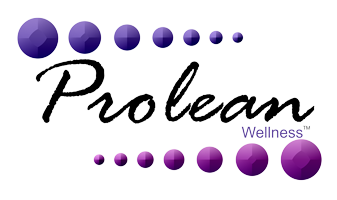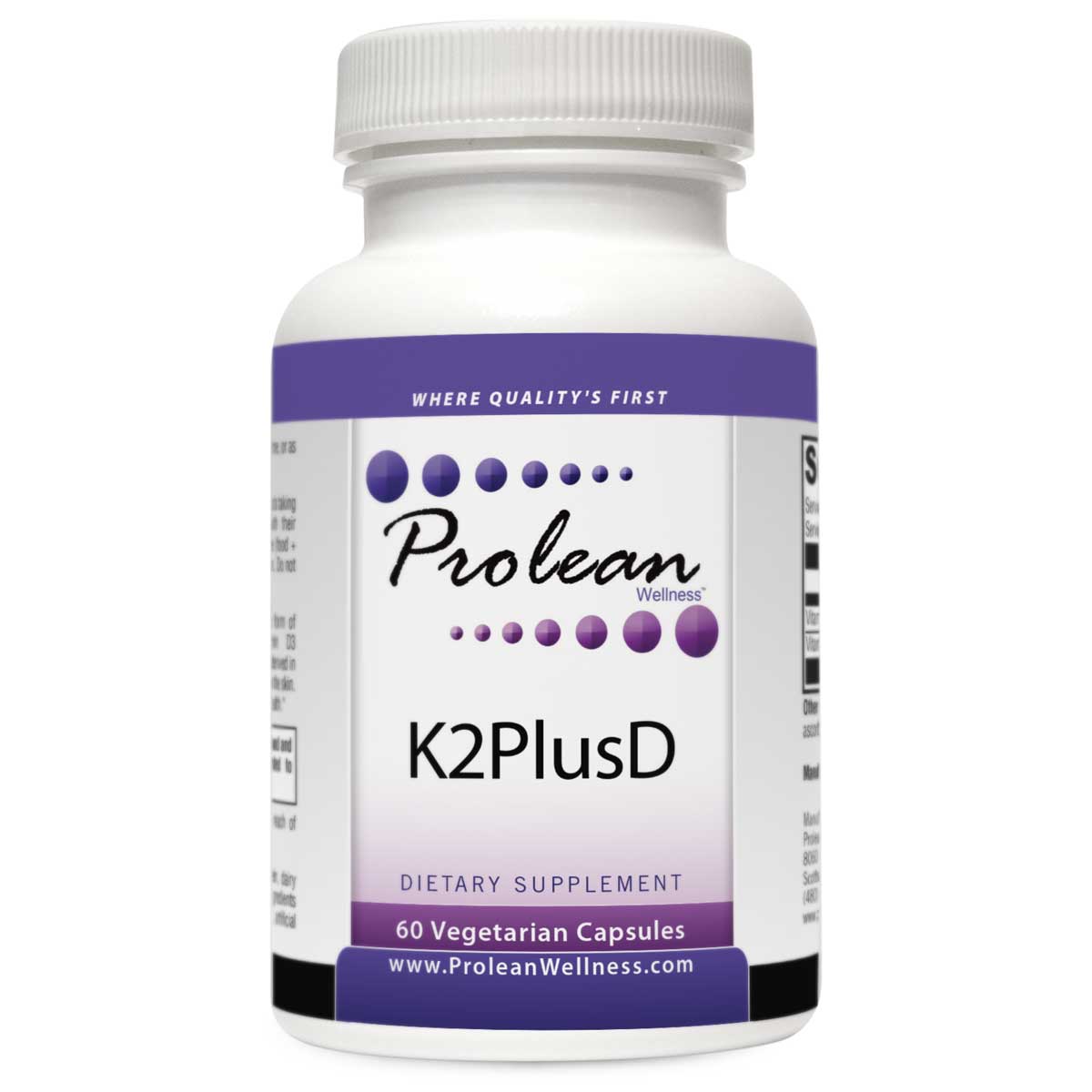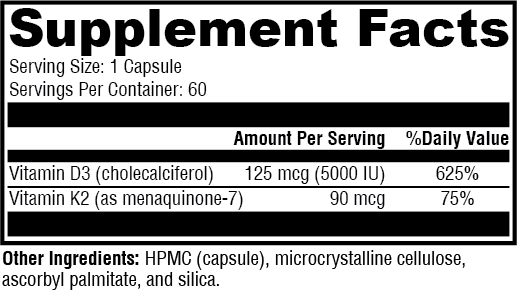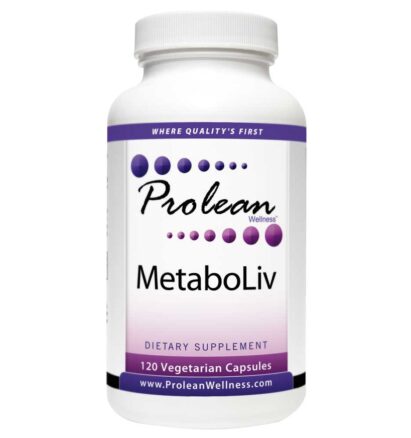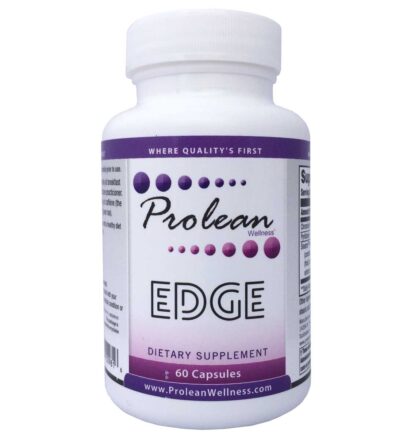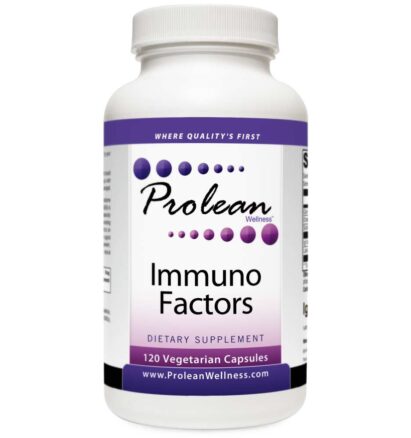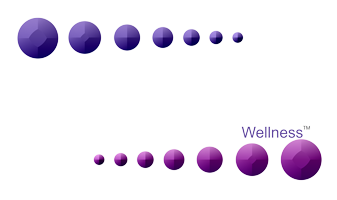Description
There are only three methods to get Vitamin D into your system.
- Nutrition – Foods containing Vitamin D include fatty fish, beef liver, egg yolks or shitake mushrooms – esp if sundried.
- UVB exposure – sunscreen and clothing block UVB rays from creating the chemical reaction on the skin that produces Vitamin D
- Supplementation
Because of the limited availability of food sources containing Vitamin D and the low amount of sun exposure most people get, supplementation may be the best way to increase serum levels of Vitamin D.
K2-D3 5000 features the most bioavailable and bioactive form of supplemental vitamin K2 available and vitamin D3 (cholecalciferol), the identical form in which vitamin D is derived in the body from cholesterol and synthesized by sunlight on the skin. Studies confirm safety and efficacy for bone and heart health.*
Vitamin D (as D3)
Although vitamin D3 (cholecalciferol) is made in the skin when
7-dehydrocholesterol reacts with sunlight, many things affect the degree to
which this biosynthesis occurs, including time of day, seasons, location, smog/
pollution, clothing, shade of skin (darker skin requires more sun), and sunscreen
use. Low-cholesterol diets and certain cholesterol therapies can also affect vitamin
D formation. By some estimates, one billion people worldwide have vitamin D
deficiency or insufficiency.[18] The body needs vitamin D to absorb calcium, and the
importance of vitamin D in skeletal health and bone density is well-established.
Without adequate absorption, the body must take calcium from its stores in the
skeleton, which weakens existing bone and prevents the formation of strong,
new bone. Researchers suggest that vitamin D supplementation may decrease
bone turnover and increase bone mineral density.[19] A pooled analysis evaluating
11 randomized, double-blind, placebo-controlled trials supported this analysis.
It concluded that vitamin D supplementation (> 800 IU daily) was favorable
in maintaining hip and nonvertebral bone integrity in individuals aged 65 and
older.*[20]
Vitamin K2
Bone Benefits
Among the dietary factors critical to bone health, vitamin K has emerged as a key
player. Vitamin K is believed to be necessary for bone mineralization. Through
carboxylation, vitamin K activates osteocalcin, the protein needed to bind calcium
to the mineral matrix in bone.[6] Several studies have demonstrated the efficacy
of MK-7 (e.g., doses of 45-90 mcg/d) to increase osteocalcin carboxylation and
to increase the cOC:ucOC ratio. A high cOC:ucOC ratio is associated with bone
health.[1,2,4] A recent in vitro study also showed an osteogenic effect of MK-7
administration on human mesenchymal cell differentiation.[6] In addition, the
vitamin may protect bone integrity by reducing the synthesis of prostaglandin E2
or interleukin-6 by osteoclasts.[7] Animal and human studies have demonstrated
a significant beneficial effect of MK-7 supplementation on bone health.[8-10]
Vitamin K and vitamin D share some similar characteristics and are believed to act
synergistically.*[11]
Cardiovascular and Other Health Benefits
Vitamin K benefits cardiovascular health by participating in the carboxylation of
matrix GLA protein (MGP), a protein regarded to be the most potent inhibitor of
arterial calcification. Researchers have demonstrated that supplementation with
vitamin K reduces arterial calcium deposits[1,3,12] and that long-term intake of
long-chain menaquinones is inversely correlated with calcium accumulation in
arteries.*[5]
Vitamin K has specific receptor binding sites that allow it to regulate gene
activity.[13] Besides its gene-mediating effects upon critical proteins, the vitamin
can also bind with the steroid and xenobiotic receptors and influence their
expression.[14] In addition, vitamin K also demonstrates antioxidant activity[15];
reduces levels of certain markers, such as acute phase reactants (e.g., C-reactive
protein)[16]; and participates in the induction of apoptosis.*[17]

